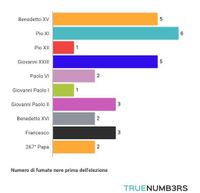On May 8, 2025, the Catholic Church witnessed a historic moment as the conclave elected Robert Francis Prevost as the new Pope, marking him as the first American to hold the position. This significant event unfolded after a series of votes, culminating in the announcement of the 267th Pope, who has chosen the name Leo XIV.
At precisely 18:08 local time, the third smoke signal emerged from the chimney of the Sistine Chapel, signaling the successful election of Prevost. This followed two earlier black smoke signals, which indicated unsuccessful voting attempts. The announcement was made by Cardinal Dominique Mamberti, who stepped out onto the loggia of the Vatican Basilica and proclaimed, "Habemus Papam," which translates to "We have a Pope."
Prevost, 69, was born in Chicago to a family with Italian, French, and Spanish roots. He has previously served as the Archbishop of Chicago and was a missionary in Peru. His first words as Pope reflected a continuation of Pope Francis's legacy, emphasizing peace. "La pace sia con tutti voi. Questa è la pace del Cristo risorto," he declared, which means "Peace be with you all. This is the peace of the risen Christ." In his address, he mentioned the word 'pace' (peace) nine times, underscoring its importance in his papacy.
The election of a new Pope became necessary following the death of Pope Francis, which left a significant void in the Church. The process of electing a Pope is steeped in tradition, involving the entire College of Cardinals and conducted in strict secrecy. The voting occurs in multiple rounds, with the results communicated to the public through the iconic smoke signals from the Sistine Chapel's chimney.
The tradition of using smoke to announce the outcome of a papal election has its roots in a system first implemented in 1914 during the conclave that elected Pope Benedict XV. For each unsuccessful ballot, black smoke is produced by burning a mixture of potassium perchlorate, anthracene, and sulfur. Conversely, white smoke, signaling a successful election, is achieved by burning potassium chlorate, lactose, and colophony.
In this recent conclave, the 133 cardinals gathered since May 7, 2025, managed to elect a Pope more swiftly than the historical average, which typically sees several rounds of voting before a decision is reached. To elect the last nine Popes, an average of 3.11 black smoke signals were required before achieving the white smoke that announces the new pontiff.
As the news spread, around 40,000 faithful gathered in St. Peter's Square, eagerly awaiting the announcement. The atmosphere was electric, filled with anticipation and hope as the crowd erupted in applause upon hearing the proclamation. The bells of St. Peter's Basilica rang joyfully, marking the occasion.
Prevost's election is seen as a bridge between traditional Catholic values and the modernizing efforts championed by his predecessor, Pope Francis. His background and experiences, particularly in a diverse and multicultural society like the United States, may influence his approach to the papacy, potentially resonating with a global audience.
The significance of this election extends beyond the immediate Catholic community. With 1.7 billion Catholics worldwide, the choice of an American Pope reflects the changing dynamics of the Church, which has been increasingly looking to engage with contemporary issues such as social justice, environmental concerns, and interfaith dialogue.
Prevost's tenure as Pope Leo XIV is expected to bring a renewed focus on peace and reconciliation, themes that have been central to the Church's mission. His emphasis on peace in his first address suggests a commitment to fostering unity and addressing divisions within the Church and society at large.
The process of electing a Pope is not without its complexities, as history has shown. For instance, during the conclave of 1958, the cardinals faced significant challenges, producing five black smoke signals before finally reaching a consensus. The ambiguity of some smoke signals during that conclave even sparked conspiracy theories about the potential election of a different candidate.
In contrast, the recent conclave's relatively swift resolution is a testament to the cardinals' ability to rally around a candidate who embodies both continuity and change. Prevost's election may symbolize a new chapter for the Catholic Church, one that seeks to balance tradition with the need for adaptation in a rapidly evolving world.
As the Catholic Church embarks on this new journey under Pope Leo XIV, many will be watching closely to see how his leadership unfolds and how it might impact the Church's role in global affairs. The expectations are high, and the faithful are hopeful that this new papacy will usher in a period of renewal and revitalization for the Church.
In summary, the election of Robert Francis Prevost as Pope Leo XIV marks a significant moment in the history of the Catholic Church. His first words, emphasizing peace, resonate with the Church's mission and the aspirations of millions worldwide. As the world turns its eyes toward the Vatican, the new Pope's actions and decisions will undoubtedly shape the future of the Church for years to come.




